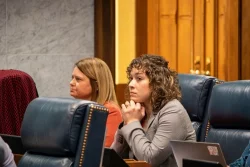- People listen to others testify before the Senate Education Committee on Wednesday. HB 1002 attempts to define the word “antisemitism” amidst growing numbers of incidents around the state and nation.
- In a two-hour discussion, some senators described as “head spinning,†House Bill 1002 passed the Senate Education and Career Development Committee in a 12-0 vote Wednesday. HB 1002 provides a definition and state statute for antisemitism. The author of the bill, Rep. Chris Jeter, R-Fishers, said the inspiration for the bill came in 2021, which he said was the highest year on record in the United States for antisemitic activity and harassment. Jeters met with several groups and formed HB 1002, using a definition by the International Holocaust Remembrance Alliance that has been adopted by 30 countries, the U.S. Department of State, and the U.S. Department of Education.Â
The IHRA’s “working definition†of antisemitism includes “denying the Jewish people their right to self-determination by claiming that the existence of a State of Israel is a racist endeavor and holding Jews collectively responsible for actions of the State of Israel,†according to The Republic.Â
However, lawmakers in the committee amended the legislation Wednesday to remove mention of the IHRA and its examples. The newest draft of the bill instead defines antisemitism as “a certain perception of Jews, which may be expressed as hatred toward Jews.â€
Rep. Chris Jeter, R-Fishers, originally wrote his legislation using a definition by the International Holocaust Remembrance Alliance. That specific definition was replaced with a different one in the committee meeting on Wednesday.
Photo by Hannah Johnson, TheStatehouseFile.com.
“We removed the references to the outside groups, IHRA, who is the author of that definition,†Jeter said. “We wanted to be careful about referencing outside groups because if their definition changes, we don’t want anyone to suppose ours has changed.â€
HB 1002 advanced through the House chamber with a unanimous vote on Jan. 18. Fourteen Democrats and three Republicans were excused.
Jeter filed the same bill during the 2023 session. It passed in the House but was not heard in the Senate. Last year, some lawmakers expressed concerns that HB 1002 would limit free speech, according to WFYI.
“After the events of Oct. 7 of last year, the bill became even more important given we almost saw a 400% rise in antisemitic acts. Unfortunately, Indiana was not immune from that rise. We saw sort of a new wave of antisemitism that sort of reared its head at our college campuses with calls for genocide for Jewish people and it kind of culminated,†Jeter said. “Many of you saw the refusal of some of the presidents of our most prestigious institutions … to say that calls for Jewish genocide violated their school’s free speech policy.â€
On Oct. 7, a surprise attack by Hamas-led fighters killed at least 1,400 people in Israel. Israel’s response has led to the deaths of more than 29,000 Palestinians as the war continues.
At the Statehouse, 24 people appeared before the committee to testify on the controversial bill.
Rabbi Hal Schevitz testifies in the Senate Education Committee Wednesday. He stated he represented his Jewish community and believes HB 1002 should be passed to protect them.
Photo by Hannah Johnson, TheStatehouseFile.com.
Ben Auslander, a junior at Carmel High School and president of the Jewish Student Union at his school, said he doesn’t support the version amended on Wednesday but the House-passed version of HB 1002.Â
“This bill is personal to me because I have experienced and witnessed antisemitic incidents firsthand. I’ve encountered students who have exclaimed ‘Heil Hitler’ when they saw me in the hallway,†he said. “I’ve had other students call for the destruction of the state of Israel plastered on posters in classrooms.â€
Sara Borek, a senior at Westfield High School and founder and president of the Jewish Student Union at her school, also initially supported the bill as it was passed in the House but struggled to support the new amended version.Â
“I don’t see how the vagueness left after the amendments will provide any basis to address antisemitism,†she said. “Antisemitism is ancient and ever-evolving, and without a clear definition, when Jewish students call it out, we are gaslit endlessly.â€
Ali Saeed, president of Indiana Muslim Advocacy, opposed the prior language of the bill and now supports it.Â
“Most of our concerns were related to very specific language that was in there that conflated antisemitism with criticism against the state of Israel,†Saeed said. “As this amendment stands now, most of those concerns have been addressed.â€
Omar Daas, a sophomore at Butler University, said his views on the bill changed as the legislature continued its discussion.Â
“I oppose the original version of HB 1002, for I fear this will give any student or professor the ability to target me and my personal views, and the incidents on campus would just worsen. I support this bill as amended,†he said.
Several testifiers brought up the effects on them following the Hamas attack.Â
Rabbi Sue Silberberg, executive director for the Hillel Center at Indiana University, said, “Since Oct. 7, this pride has been shaken by fear and a deep sadness that brought me here today. And now I’m even sadder to see the amendment added to this bill because every single day since Oct. 7, I have been working with and seeing students who are facing severe antisemitism on campus in a way that I have not seen in the past 35 years.â€
Macklin Lapp, a freshman at Indiana University studying sociology, said prior to Oct. 7, he experienced antisemitism while walking to class.Â
“I was subjected to hurtful slurs such as ‘dirty Jew’ from another student. I had never encountered this student before and haven’t crossed paths since, but the mere sight of my yarmulke was sufficient for them to harbor hateful feelings towards me.â€
Lapp continued: “After Oct. 7, the antisemitism only became louder and more prominent. For weeks following that incident, I wore a baseball cap instead of a yarmulke out of fear of showing my identity.â€Â
After the testifiers finished, the members had a discussion, and Sen. Jean Leising, R-Oldenburg, said, “I was convinced to begin with that everyone loved this bill, then the last half of the testimony, I decided that wasn’t the case.â€Â
Leising and other members of the committee came to an agreement to not kill the bill but move it forward to keep working on it.
Sen. J.D. Ford added, “We don’t know what it will look like in the final version of all this, but I think keeping it moving and keep working on this is incredibly important.â€
FOOTNOTES: DeMarion Newell is a reporter for TheStatehouseFile.com, a news website powered by Franklin College journalism students.





